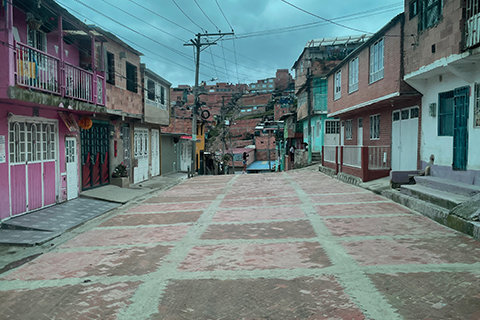The Power of Grassroots Initiatives to Create a More Peaceful Future
HU’s Lexi Mairone reflects on how local grassroots initiatives are shaping the future for communities across Colombia.
HU’s Lexi Mairone reflects on how local grassroots initiatives are shaping the future for communities across Colombia.

This is the fourth in a series of blogs on peacebuilding in Colombia. View the full series here.
On a sunny day in Medellín, some of our Humanity United team went for a walk in the botanical gardens with Milton, a community leader from Buriticá. Milton made the journey to share with us about how development projects had disrupted his community and threatened their traditional livelihoods. Most notable is the Hidroituango project, a hydroelectric dam on the Cauca River that will generate electricity to be sold in the country, and eventually throughout South America. The problem, we learned, was that Milton’s community made their livelihoods from the river as fishers and gold miners. With the dam months away from operation, the community needed to find a way forward.
For some, the Hidroituango is a success story and an opportunity for Colombia to produce green energy for the region. For many others, the dam represents devastation of livelihoods and ecosystems. For years, movements have organized nonviolent actions to stop the project from moving forward. Now, the project is near completion and has already begun operating. The Cauca River has risen to levels that make it unsafe to mine or fish. Efforts to block the project may have failed, but Milton remains determined to ensure his community has a role in defining their future. To that end, he engages in dialogues with municipal leaders and decision makers at the utility company that manages the project. Through a program called la Ruta de la Confianza (the Path of Trust) Milton and other community members work with municipal and corporate stakeholders to develop collaborative initiatives that address environmental issues, economic and social development, gender, participation, entrepreneurship, and mental health.
In this story of local conflict, the nation’s history of war and peace agreements stands as a backdrop. Many of Milton’s community are also registered in the National Registry of Victims (RUV) of Colombia’s armed conflict, and the people carry the trauma of their past. Our conversation with Milton underscored the need to pay attention not only to negotiations and peace agreements at a national level, but also to the everyday forms of conflict that challenge communities as well as the everyday efforts to transform conflict into peace.
This is why Humanity United takes an ecosystem approach to our work in Colombia, supporting organizations and initiatives that work at multiple levels and across different territories. Our guiding principle is to support the agency and power of people working locally – people like Milton – to achieve meaningful change in their contexts.
In his book “The Moral Imagination: The Art and Soul of Building Peace,” John Paul Lederach writes about creativity as a powerful tool for conflict resolution. Constructive social engagement happens when communities create together that which does not yet exist.
This is the vision of HU partner TerritoriA, an organization supporting an emerging local civil society infrastructure of territorial foundations (a Colombian spin on the community foundation movement). The vision of the territorial foundations is to be a space for communities to contribute to autonomy and sustainability. Community leaders are accompanied through learning journeys to co-create social infrastructure that makes collective action possible, utilizing skills like dialogue, systems thinking, and participatory methods. In this way, territorial foundations become spaces that are conducive to the process of creation.
Members of the Humanity United team had the opportunity to meet some of the community members behind the creative initiatives supported by Paisano, the first Territorial Foundation in Colombia, which connects and supports local initiatives. One of these is Mama, a women-led collaborative who came together during the Covid-19 pandemic to build a mutual aid effort centered on a circular economy approach. At Mama, women donate clothing to be mended and circulated back into the community at a low cost. These women leaders also use their sewing skills to create reusable diapers and feminine hygiene products for their community and other communities of women, including a partnership with indigenous communities nearby. Mama leader Jessica spoke about how these efforts enable a new kind of cooperation of the women in Soacha and spread practices of sustainable living.
When people come together across divisions to create their shared future, their ideas cross traditional sectors. While we came to Colombia to learn about peace, we heard about efforts related to gender, climate, development, livelihoods, health, indigenous rights, and more. In this way, grassroots leaders demonstrate a deep understanding of how all these things are connected in systems, and that the many issues we face globally and locally cannot be disentangled from one another.
Grassroots initiatives have the unique ability to engage people in the creation of their own future. This is a powerful goal anywhere in the world, but especially in places like Colombia where people are hungry for a peaceful future for their country.
Those of us concerned with global issues like peace and conflict, climate and human rights should remember that each of these issues manifests in particular contexts – and it is from these specific places that the future will come, through the persistent creativity of people.
Many thanks to Milton, Fundación Ideas para la Paz, TerritoriA, Paisano, and Mama who shared their time and stories with us.
Lexi Mairone is a Manager for HU’s Peacebuilding body of work, where she supports grants related to global peacebuilding innovation, field building, and systems change.